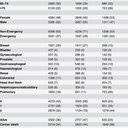The role of thiamine dependent enzymes in obesity and obesity related chronic disease states: A systematic review.
Mots clés
Abstrait
The WHO 2016 report indicates that worldwide obesity is rising, with over 600 million people in the obese range (BMI>30). The recommended daily calorie intake for adults is 2000 kcal and 2500 kcal for women and men respectively. The average American consumes 3770 kcal/day and the average person in the UK consumes 3400 kcal/day. With such increased caloric intake, there is an increased load on metabolic pathways, in particular glucose metabolism. Such metabolism requires micronutrients as enzyme co-factors. The recommended daily allowance (RDA) for thiamine is 1.3 mg/day and 0.5 mg thiamine is required to process 1000 kilocalories (kcal). Therefore, despite the appearance of being overfed, there is now increasing evidence that the obese population may nutritionally depleted of essential micronutrients. Thiamine deficiency has been reported to be in the region of 16-47% among patients undergoing bariatric surgery for obesity. Thiamine, in turn, requires magnesium to be in its active form thiamine diphosphate, (TDP). TDP also requires magnesium to achieve activation of TDP dependent enzymes, including transketolase (TK), pyruvate dehydrogenase (PDH) and alpha-keto glutaric acid dehydrogenase (AKGDH), during metabolism of glucose. Thiamine and magnesium therefore play a critical role in glucose metabolism and their deficiency may result in the accumulation of anaerobic metabolites including lactate due to a mismatch between caloric burden and function of thiamine dependent enzymes. It may therefore be postulated that thiamine and magnesium deficiency are under-recognized in obesity and may be important in the progress of obesity and obesity related chronic disease states. The aim of the present systematic review was to examine the role of thiamine dependent enzymes in obesity and obesity related chronic disease states.


